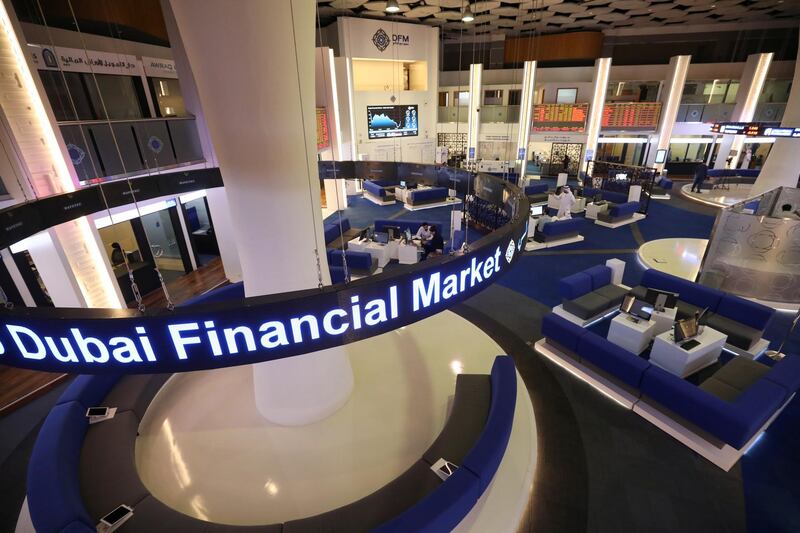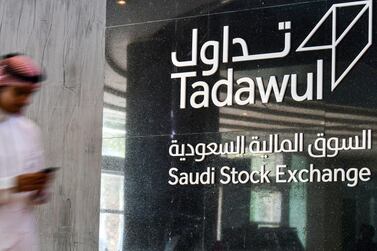Gulf markets rebounded on Tuesday after two days of volatility that wiped nearly $400 billion (Dh1.47 trillion) off equities, as the US government said it would seek payroll tax cuts and "dramatic" measures to help American workers and boost investor confidence.
The rise in GCC equities follows a recovery in oil prices on Tuesday after they slumped nearly 31 per cent in intraday trading on Monday as Saudi Arabia and Russia failed to reach an agreement on further production cuts. Brent, the most widely-traded commodity benchmark, climbed 8/4 per cent to $37.23 per barrel at 5.36pm UAE time.
Saudi Arabia's Tadawul, the largest stock market in the Arab world, climbed nearly 7.1 per cent to wipe out most of the losses from Monday. Saudi Aramco, the world's biggest oil producing company, surged nearly 10 per cent and Al Rajhi Bank gained 8.8 per cent at the close.
“The bounce today follows a pretty calamitous fall in recent days. [But] it does not mean we are out of the woods [yet],” said Hasnain Malik, head of equity strategy at Dubai-based Tellimer. “The richest parts of the GCC have sovereign wealth and foreign reserve buffers, of course, but that in no way provides immunity from what are universal negative factors.”
In the short term, the downside risks apply everywhere and for asset managers who are restricted to regional markets it make sense to “simply carry on and focus on the same debt and equity securities they liked before these falls”, he said.
Kuwait's Premier Market, which suspended trading in two sessions this week, climbed more than 6 per cent during early trade on Tuesday, but closed the session 0.4 per cent lower.
Dubai’s benchmark, the Dubai DFM General Index, closed 7.3 per cent higher. Emaar Properties and the biggest UAE Sharia-compliant lender, Dubai Islamic Bank, rose 7.4 per cent and 10.4 per cent, respectively.
In Abu Dhabi, Aldar Properties rose almost 14 per cent, while Abu Dhabi Commercial Bank gained 8 per cent to help the emirate's main index close 5.5 per cent higher.
The benchmark indices in the Oman and Bahrain also rose 0.7 per cent and 1.5 per cent, respectively.
US President Donald Trump’s announcement that the White House and Congress would meet on Tuesday to consider “very substantial” economic relief measures, which may include a payroll tax cut, also helped sentiment. US markets rebounded strongly, with the Dow Jones Industrial Average up 3.3 per cent, the S&P500 index climbing 3 per cent and the Nasdaq Composite index trading 2.8 per cent higher.
This helped to regain some of the losses experienced on Monday, which was one of the worst days for the global equity markets in more than a decade, with the MSCI global index falling more than 7 per cent on Monday and the Dow Jones closing down 7.8 per cent after suffering its biggest one-day points loss ever.
“The stock market rally has always been a key proof of success for Donald Trump, and what has been happening in the market recently may pull the carpet from under his feet during the critical year of presidential election,” Ipek Ozkardeskaya, a senior analyst at Swissquote Bank said in a note on Tuesday.
“If the Federal Reserve’s emergency action [a surprise 50 basis point rate cut] couldn’t give the market a jolt, then it wouldn’t be a surprise to see Donald Trump stepping in with massive fiscal measures to save the year.”
The Fed is meeting on March 17-18 and some analysts expect another cut of 50 basis points or more in its policy rates. President Trump, who has repeatedly criticised the Fed for raising rates or not lowering them enough, has made no qualms about welcoming negative interest rates in the US to keep the country's longest economic expansion cycle going.
"Broader monetary stimulus such as policy rate cuts or asset purchases can lift confidence and support financial markets if there is a marked risk of a sizeable tightening in financial conditions," Gita Gopinath, the International Monetary Fund's chief economist, said late on Monday. "Broad-based fiscal stimulus consistent with available fiscal space can help lift aggregate demand, but would most likely be more effective when business operations begin to normalise."








